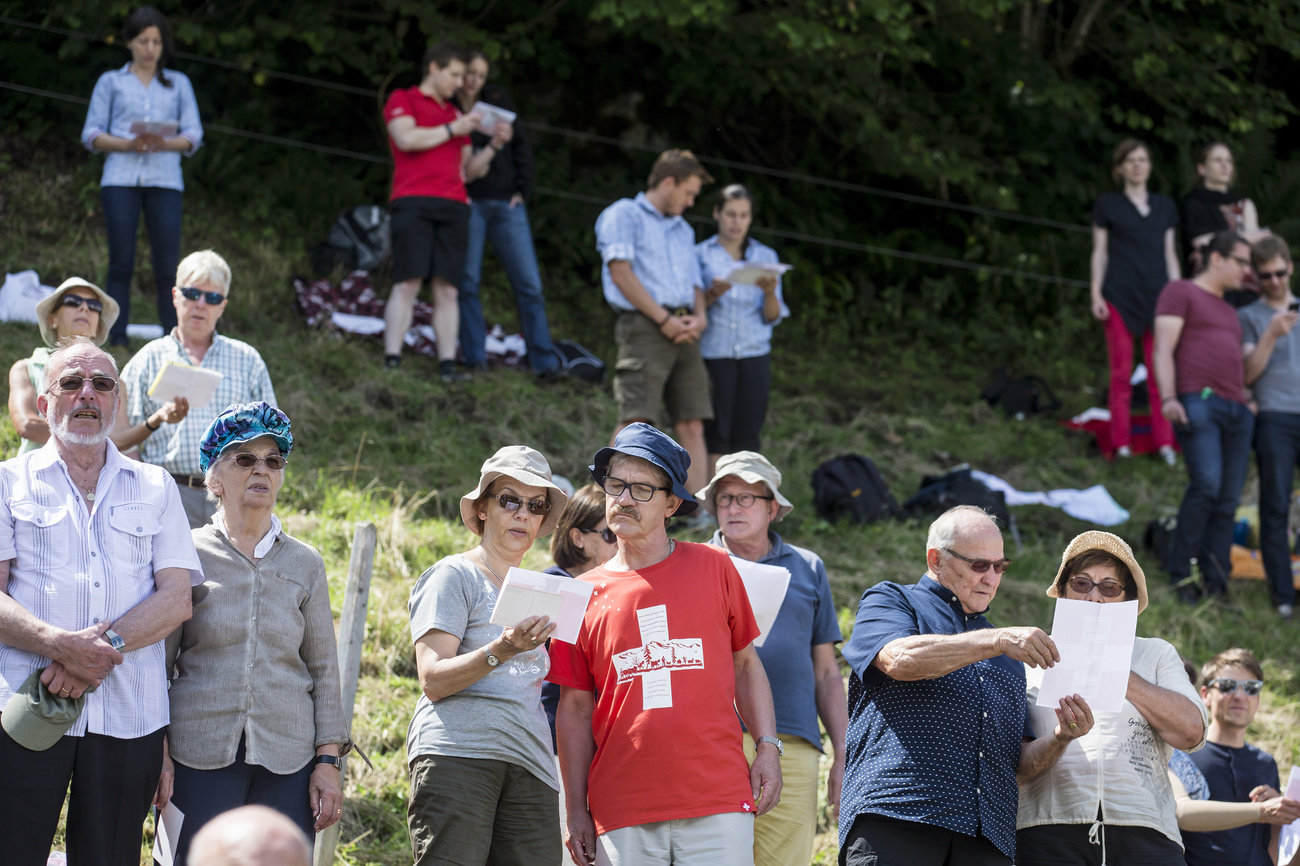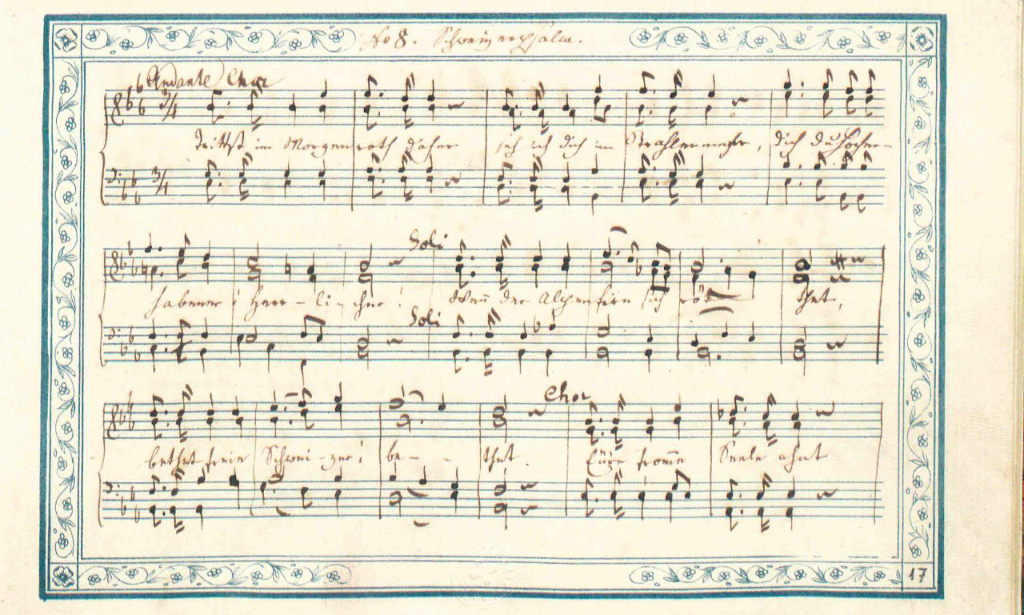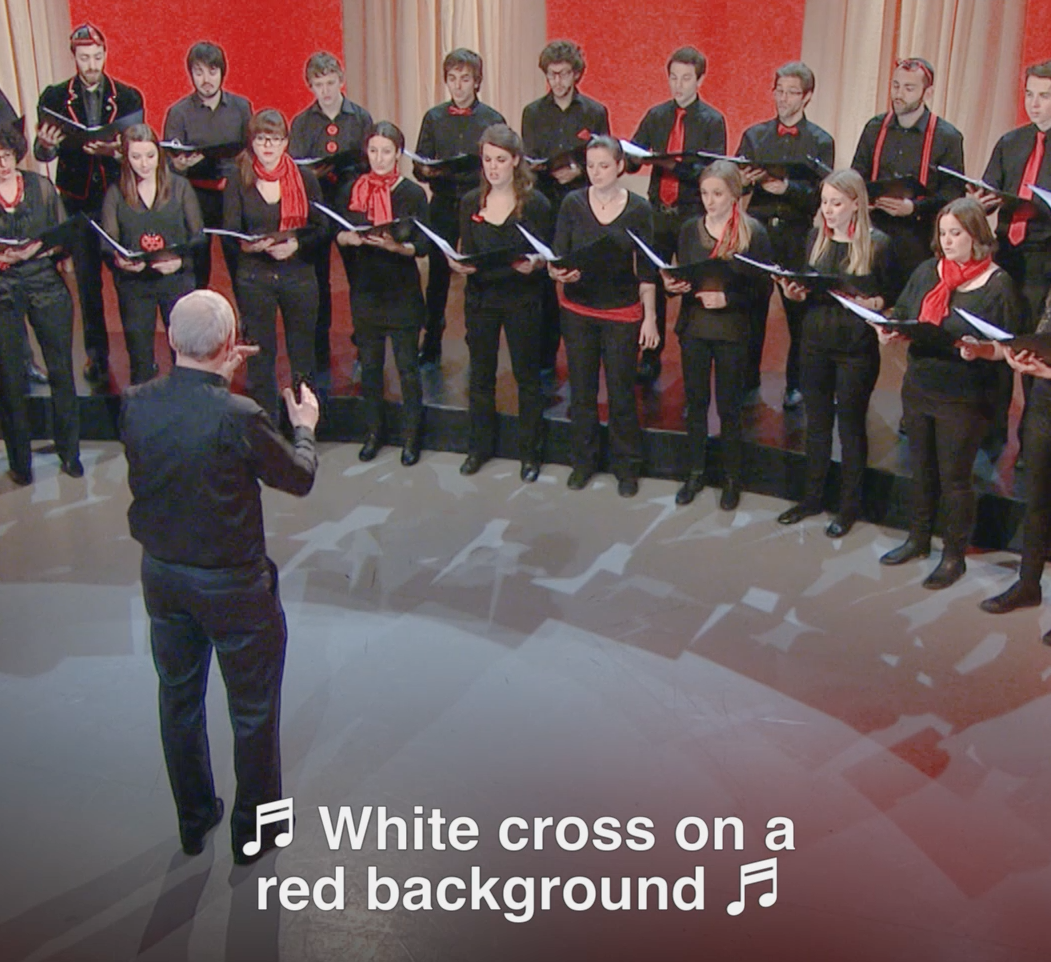
The Swiss national anthem: outdated but resilient

Few would claim it’s the most stirring national anthem, and few know it by heart, but the Swiss Psalm has survived all attempts at replacement.
You know when you’re singing a song in a group and someone gets the words wrong? This happens all the time in Switzerland when singing the national anthem – and no one’s even making a mistake.
That’s if people actually bother singing. Many members of the men’s national football team, for example, keep their lips sealed before matches (the women’s team at the recent European Championships was less hesitant about singing).
When former national footballer Valon Behrami (with blond highlights in that video from the 2018 World Cup) was asked about this by Swiss public television, RSI, in June, he came up with three excuses for his silence: the confusion of opponents at hearing different languages, his poor singing, and the fact that he couldn’t remember the words.
Behrami is in good company. Knowing even the first verse by heart is a rare skill. Even former president Moritz Leuenberger confessed that he often only moved his lips, “not having memorised the redundant verses”.
Leuenberger’s comments wouldn’t have pleased Leonhard Widmer, the author of the text, and Alberich Zwyssig, who composed the music.
Born of an unusual friendship
Widmer and Zwyssig came from opposite worlds. The former was a radical-liberal progressive Protestant, the latter a Cistercian monk. Nevertheless, a friendship developed. Widmer, as well as running a sheet music shop frequented by the monk, was also a poet, and in 1841 he asked Zwyssig to set one of his poems to music.

Zwyssig recycled a liturgical hymn he had written a few years earlier. The result: the Swiss Psalm, a hymn that combines God, mountains and morning light in a spiritual-patriotic mix. The song was well-received, spread spontaneously and was soon being heard at national events.
It would take decades, however, before it became a national anthem.
First, because until the spread of radio and television, anthems were often relegated to national ceremonies (not only in Switzerland). As they didn’t reach a wide audience, declaring them official was fairly low on the authorities’ list of priorities. The government repeatedly emphasised that such a decision wasn’t within its competence.
Second, the Swiss Psalm had a competitor, also sung at official events: Rufst du, mein Vaterland? (Call’st Thou, My Fatherland?) by the poet and professor of philosophy Johann Rudolf Wyss (who also edited the novel The Swiss Family Robinson, written by his father Johann David Wyss, published in 1812).
God save the Swiss Psalm
The two texts were very different. The first stanza of Widmer/Zwyssig’s psalm can be summarised as follows: the beauty of the Alps, illuminated by the morning light, instils great faith and a desire to pray for the homeland.
The poem by Wyss, on the other hand, is much more direct. Roughly paraphrased: Oh, how beautiful it is to die for one’s country! I hope it happens to me – I couldn’t ask for anything better.
Italian:
Quando bionda aurora il mattin c’indora
l’alma mia t’adora re del ciel!
Quando l’alpe già rosseggia
a pregare allor t’atteggia;
in favor del patrio suol,
in favor del patrio suol,
cittadino Dio lo vuol,
cittadino Dio, si Dio lo vuol.
German:
Trittst im Morgenrot daher,
Seh’ich dich im Strahlenmeer,
Dich, du Hocherhabener, Herrlicher!
Wenn der Alpenfirn sich rötet,
Betet, freie Schweizer, betet!
Eure fromme Seele ahnt
Eure fromme Seele ahnt
Gott im hehren Vaterland,
Gott, den Herrn, im hehren Vaterland.
French:
Sur nos monts, quand le soleil
Annonce un brillant réveil,
Et prédit d’un plus beau jour le retour,
Les beautés de la patrie
Parlent à l’âme attendrie;
Au ciel montent plus joyeux
Au ciel montent plus joyeux
Les accents d’un coeur pieux,
Les accents émus d’un coeur pieux.
Romansh:
En l’aurora la damaun ta salida il carstgaun,
spiert etern dominatur, Tutpussent!
Cur ch’ils munts straglischan sura,
ura liber Svizzer, ura.
Mia olma senta ferm,
Mia olma senta ferm Dieu en tschiel,
il bab etern, Dieu en tschiel, il bab etern.
English:
When the morning skies grow red
And over us their radiance shed
Thou, O Lord, appeareth in their light!
When the alps glow bright with splendor,
Pray to God, to Him surrender!
For you feel and understand
That God dwelleth in this land.
That God, the Lord, dwelleth in this land.
Source: Swiss National LibraryExternal link / about.chExternal link
Which version was preferred depended on international geopolitics. In 1961, the government – called upon for the umpteenth time to decide on the matter – provisionally designated the Swiss Psalm as the national anthem. This provisional status lasted for 20 years, until April 1, 1981, when it became Switzerland’s official national anthem.
What tipped the scales was not the pacifist spirit of the time, but a musical problem.
Rufst du, mein Vaterland? was sung to the tune of the British national anthem God Save the King/Queen, as were the anthems of various countries (Liechtenstein’s still is) and this was beginning to cause a fair bit of embarrassment at international sporting events.
Attempts at change
Some members of the older generation still turn their noses up at this decision. However, it’s not only those nostalgic for Rufst du, mein Vaterland? who aren’t particularly keen on the current anthem.

More
Old anthem, new lyrics
In 2004 the then Social Democrat parliamentarian Margret Kiener Nellen tabled a motion for the modernisation of the anthem. She reckoned it was too nationalistic, complicated, bombastic and hostile to women and foreigners. (Other critics have said it sounds more like a biblical weather forecast than a national anthem.) The motion was withdrawn due to strong opposition in parliament.
Some ten years later, the Swiss Society for the Common Good tried again, holding a competition to change the words that, according to the society, were not known by the population and no longer reflected the values of the country.
“When you see how people in other countries know their national anthems by heart, and sing them with passion and with joy,” then you realise that Switzerland has a problem, the society’s president, Jean-Daniel Gerber, told Swissinfo at the time.
Coincidentally, the author of the winning text, announced in September 2015, was also a Widmer: Werner Widmer. He replaced religious references with modern constitutional values, including unity in diversity.

More
A popular update for the Swiss anthem
Werner Widmer’s version with the verse uniting all four national languages:
With the chosen text and the support of 250 well-known personalities, including former members of the government (yes, even Moritz Leuenberger), the Swiss Society for the Common Good now just needed to overcome the last small hurdle: teaching and making the entire country appreciate the new anthem.
It was a resounding failure. Of the 2,300 municipalities invited to promote the new anthem on National Day, only about 20 answered the call.
Until the next attempt at change – and probably several after that – the Swiss Psalm will therefore remain in place. After all, even if it’s not so modern, one can argue that it reflects Switzerland and its politics well. First, because it is slow, and second, like many laws passed by parliament, it represents the solution that generates the least amount of collective dissatisfaction.
Edited by Daniele Mariani. Adapted from Italian by Thomas Stephens
More

In compliance with the JTI standards
More: SWI swissinfo.ch certified by the Journalism Trust Initiative






























You can find an overview of ongoing debates with our journalists here . Please join us!
If you want to start a conversation about a topic raised in this article or want to report factual errors, email us at english@swissinfo.ch.